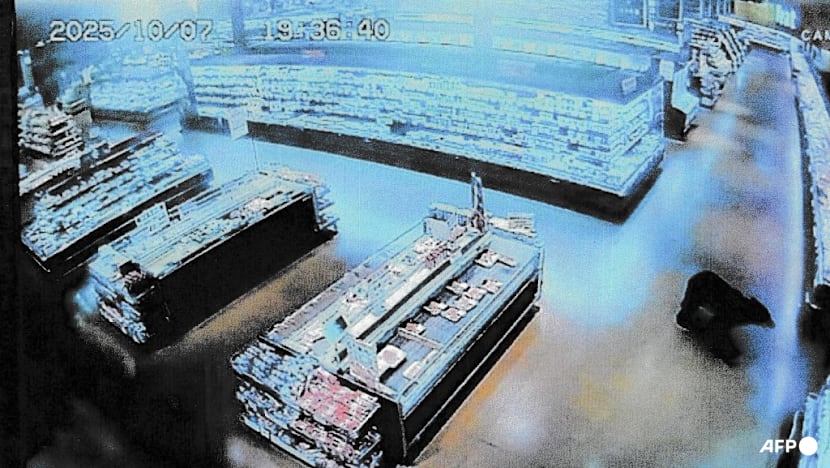Japan vows tougher measures after record bear attack deaths
Japan's new Environment Minister Hirotaka Ishihara called the bear attacks "a big problem, a serious problem".

This handout photo taken on Oct 7, 2025 and released by Gunma Prefectural Police via Jiji Press shows CCTV camera footage of a bear walking inside a supermarket in Numata, Gunma prefecture. (Photo: Handout/JIJI PRESS/GUNMA PREFECTURAL POLICE VIA JIJI PRESS/AFP)
TOKYO: Japan's new environment minister vowed tougher measures on Wednesday (Oct 22) after bear attacks in the country killed a record nine people this year.
Bears have been increasingly encroaching into towns where the human population is ageing and dwindling.
New Environment Minister Hirotaka Ishihara called the attacks "a big problem, a serious problem".
"We are committed to further strengthening various measures, including securing and training government hunters and managing the bear population," he told a news conference on Wednesday.
Ishihara was appointed to his post late Tuesday when new Prime Minister Sanae Takaichi launched her government.
This year's numbers far surpassed the previous high of five human fatalities recorded in the 2023-24 fiscal year.
The latest victims include a man in his 70s who was found dead on Oct 10 on a mountain in northern Iwate prefecture, where he had been picking mushrooms.
Another Iwate resident was found dead last week in a forest near a hot spring facility where he worked.
A bear attacked a couple in their 80s in Fukushima prefecture outside their house on Wednesday, causing injuries to their faces and necks, local media reported.
Bears have attacked tourists, entered stores and appeared near schools and parks, particularly in northern regions.
Japan has two types of bear: Asian black bears - also known as moon bears - and the bigger brown bears that live on the main northern island of Hokkaido.
Thousands of bears are shot every year, although Japan's ageing human population means that the number of hunters is declining.















